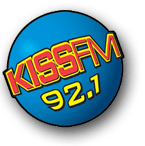KTSR
KTSR (92.1 FM, " 92.1 The Bridge") is a Hot AC formatted broadcast radio station licensed to DeQuincy, Louisiana, serving Southwest Louisiana.[1] KTSR is owned and operated by Townsquare Media.[3] The station's studios are located on North Lakeshore Drive, just northwest of downtown Lake Charles, and its transmitter is located in Sulphur, Louisiana.
| City | DeQuincy, Louisiana |
|---|---|
| Broadcast area | Lake Charles, Louisiana, Southwest Louisiana |
| Frequency | 92.1 MHz |
| Branding | 92.1 The Bridge |
| Programming | |
| Format | Hot AC[1] |
| Affiliations | Bob and Sheri |
| Ownership | |
| Owner | Townsquare Media (Townsquare Media Lake Charles License, LLC) |
| Sister stations | KHLA, KKRC, KJMH, KLCL, KNGT |
| History | |
| First air date | November 1, 1985 (as KROK)[2] |
| Former call signs | KROK (1984-2003) KNUF (2003-2004) |
| Call sign meaning | play on the word "Star" former branding; also This Station Rocks |
| Technical information | |
| Facility ID | 71555 |
| Class | C3 |
| Power | 13,500 watts |
| HAAT | 136.7 meters (448 ft) |
| Transmitter coordinates | 30°13′16.0″N 93°18′40.0″W |
| Links | |
| Webcast | KTSR Webstream |
| Website | KTSR Online |
History
The station first signed-on on November 1, 1985. It was originally a Kiss FM format. In 2017 the station shifted to classic rock as “Classic Rock 92.1”. On May 22, 2020 at 4:00 PM, Townsquare Media changed the classic rock format to Hot AC as the new “92.1 The Bridge”.
Former logos

gollark: RFID is generally rather short-range, so no.
gollark: Computer vision is hard, RFID tags would be easier.
gollark: Google occasionally does good things for privacy, weirdly.
gollark: My own phone has WiFi drivers which apparently allow randomizing MAC address on every connection, thus good.
gollark: Although MAC randomization countermeasures are present in most mobile OSes now.
References
- "Arbitron Station Information Profiles". Nielsen Audio/Nielsen Holdings. Retrieved June 15, 2015.
- Broadcasting Yearbook 2010 (PDF). ProQuest, LLC/Reed Publishing (Nederland), B.V. 2010. p. D-252. Retrieved June 15, 2015.
- "KTSR Facility Record". Federal Communications Commission, audio division. Retrieved June 15, 2015.
External links
- 92.1 The Bridge Online
- KTSR in the FCC's FM station database
- KTSR on Radio-Locator
- KTSR in Nielsen Audio's FM station database
This article is issued from Wikipedia. The text is licensed under Creative Commons - Attribution - Sharealike. Additional terms may apply for the media files.